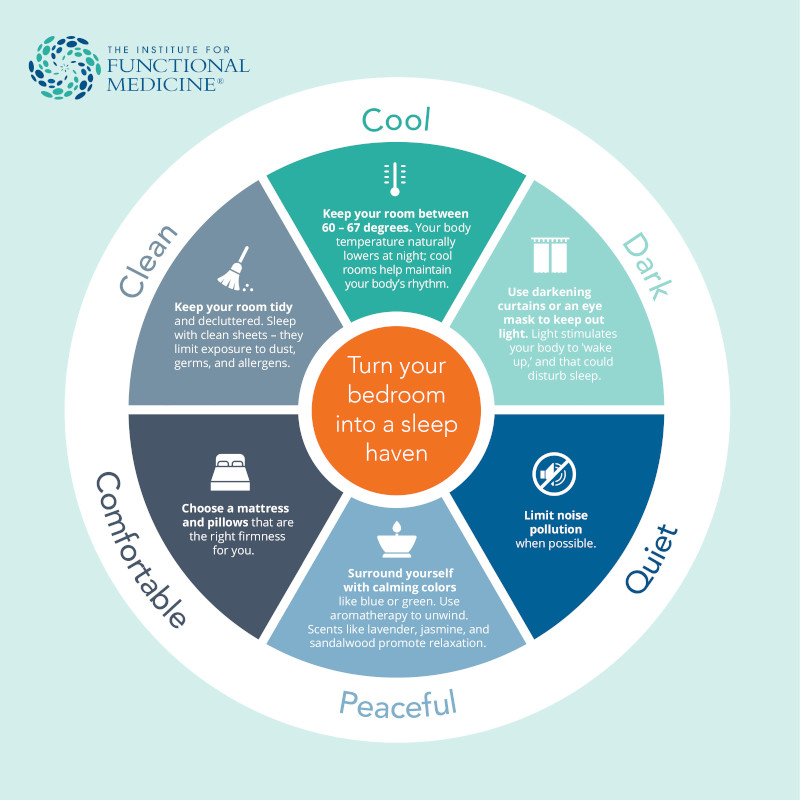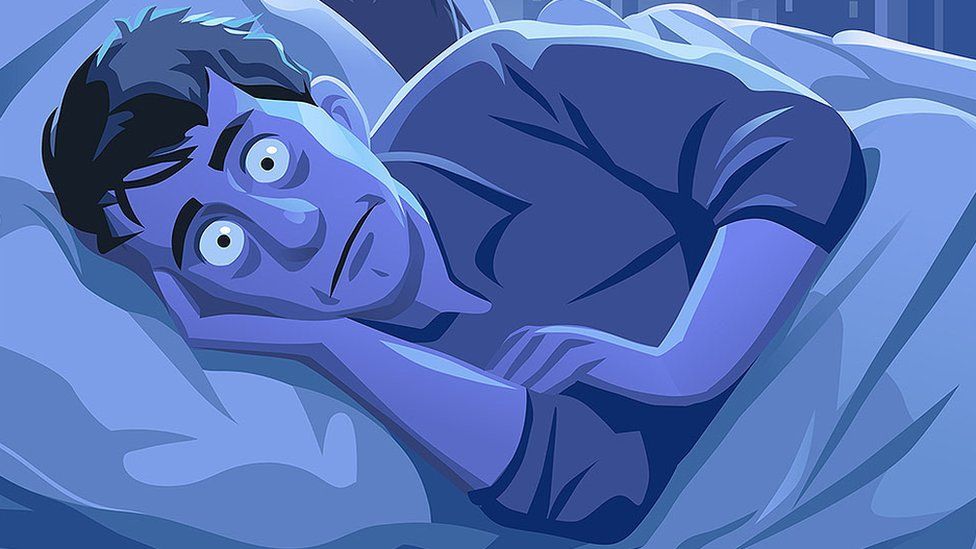Sleep Statistics
60% of healthcare professionals do not feel that they have enough time to have a discussion with their patients about insomnia during regular office visits. I’m not one of them because when it comes to your health, a deep restful sleep is the most important thing you can do to repair, reset, and optimize your body.
The circadian rhythm controls your sleep-wake cycles. This is managed in the suprachiasmatic nucleus of the hypothalamus deep inside your brain. More specifically, a cluster of about 20,000 brain cells that sit above the optic chiasm – nerves that go from your eyes to the back of your head. When light hits your eyes – whether the lids are shut or not – it triggers this system to start producing serotonin, the day cycle hormone. At night, exposure to dark – or the lack of light – shuts off serotonin and your brain starts to produce melatonin which lulls you off to sleep. It’s a delicate balance. When the circadian rhythm is imbalanced you don’t sleep well. When you don’t sleep well, you are at an increased risk of a variety of chronic illnesses including heart disease, digestive disorders, and in particular brain shrinkage. Shift workers are at particularly increased risk because they have desynchronosis – a chronic upset in their circadian rhythm. Leptin is an appetite-regulating hormone. It is well established that when you don’t enough sleep, leptin levels fall and you have a significantly increased appetite promoting weight gain. Lack of sleep also contributes to digestive disorders, irritable bowel issues, constipation, cardiovascular disease, memory failure, and brain shrinkage.
Caffeine is the most popular drug in the world. All over the globe people consume caffeine on a daily basis in the form of coffee, tea, cocoa, chocolate, soft drinks, many over the counter medications and some prescription drugs. We are the only animals on the planet who consume such high amounts of caffeine which in excess contributes to sleep interruption and, oddly, we are the only mammal that willingly delays sleep.
In general, most healthy adults need 7-9 hours of sleep a night. However, some individuals can function without sleepiness or drowsiness after as little as six hours of sleep. Others can’t perform at their peak unless they’ve slept ten hours.
Sleep Architecture
There are two basic types of sleep: rapid eye movement or REM and non-REM sleep (which has four different stages). Each is linked to specific brain waves and brain activity. The average person needs to cycle through all five stages at least 4-5 times a night for optimal brain function during the day. Each cycle takes approximately 60-90 minutes. If you do the simple math, that is how scientists arrived at the notion of 7-9 hours of sleep and why we most often hear “get your 8 hours”. But, it’s not just about clocking those hours on your pillow. The quality of sleep matters a LOT.
Stage 1 non-REM sleep is the change from wakefulness to sleep. During this short, relatively light sleep, your heartbeat, breathing, and eye movements slow, and your muscles relax with occasional twitches.
Stage 2 non-REM sleep is a period of light sleep before you enter deeper sleep. Your heartbeat and breathing slow, and muscles relax even further. Your body temperature drops and eye movements stop. Brain wave activity slows but is marked by brief bursts of electrical activity.
Stage 3 and 4 non-REM sleep is the period of deep sleep that you need to feel refreshed in the morning. It occurs in longer periods during the first half of the night. Your heartbeat and breathing slow to their lowest levels during sleep. Your muscles are relaxed and it may be difficult to awaken you. Brain waves become even slower. These stages are the most important type of sleep for optimal brain health.
REM sleep first occurs about 90 minutes after falling asleep. Your eyes move rapidly from side to side behind closed eyelids. Brain waves are similar to when you are awake. Your breathing becomes faster and irregular, and your heart rate and blood pressure increase to near waking levels. This is because you dream during REM sleep. Your arm and leg muscles become temporarily paralyzed, which prevents you from acting out your dreams. As you age, you sleep less of your time in REM sleep.

Centenarian Sleep
One of the largest studies done on sleep quality in centenarians was published in the journal Sleep. It looked at nearly 2,800 people over 100 and was the first to examine sleep issues in such a large sample of exceptionally old adults. Results showed that about 65 percent of the sample reported that their sleep quality was good or very good, and the weighted average daily sleep time was about 7.5 hours including naps. Centenarians were 70 percent more likely to report good sleep quality than younger participants aged 65 to 79, after controlling for variables such as demographic characteristics, socioeconomic status and health conditions.
Sleepy Genes
One reason why we sleep is to repair DNA. That is a complex and necessary process. Ironically, some people have DNA variations that make it difficult to sleep in the first place. One example would be the serotonin transporter gene-linked polymorphic region or “5-HTTLPR”. Simply put, a gene in charge of manufacturing a protein critical to the regulation of serotonin function in the brain. Its role is to terminate the action of serotonin in the synapse via reuptake. Because the serotonin-melatonin balance is so crucial to a balanced circadian rhythm, if you’ve got the “low-expressive short (S) version” you may have sleep interruption but furthermore you may benefit from supplemental 5-hydroxy-tryptophan prior to bed.
Sleep Hygiene
Sleep hygiene is what you need to do to keep a healthy amount and optimal quality of sleep. Doing this optimizes your circadian rhythm. Stop all caffeine by 11:00 AM is important. Go to bed at the same time every night to achieve about 7-9 hours restful sleep. Try setting your phone alarm one hour prior to bed time to alert you to turn it off along with all other electronics and keep the lights on low to prep your brain for a surge of melatonin. Keeping your bedroom at about 68 degrees. Make sure your bed and pillow are comfortable.
Change your mattress every 10 years. If you’re easily woken, keep white noise on to drown out random noises. Keep a dark room with blinds closed, but ensure exposure to a burst of natural sunlight first thing on waking.
If you nap, the best time to nap so as not to upset your circadian is in the mid-afternoon, but for no longer than 20 minutes. This short nap is sometimes referred to as the ‘trucker’s nap’. After 20 minutes, you quickly enter a deep phase of sleep, and to wake up abruptly from that descent will make you groggy rob you of deep sleep at night.
In general, exercising regularly makes it easier to fall asleep and contributes to sounder sleep. However, exercising sporadically or right before going to bed will make falling asleep more difficult. This is because exercise elevates body temperature and your brain and body desires to be cooler for an optimal sleep. Time your exercise to the first few hours after waking.

Sleep Supps
There are some supplements that can help with getting to sleep and staying asleep.
Melatonin can help a lot of people with their circadian rhythm. It is also a potent brain healthy antioxidant. Many studies show the use of melatonin can shorten the time it takes to fall asleep and reducing the number of awakenings. It is also very helpful in managing jet lag which significantly disrupts circadian rhythm. The best way to take melatonin is no more than 3mg/50lb body weight 1 hour prior to desired sleep time. Look for a time release format.
One supplement that is not as well known, but works beautifully, is California Poppy. This has some excellent evidence that it also helps with pain and can be a potent sedative. Many folks suffer from low back pain which causes them to experience interrupted sleep. California poppy sounds like it may be related to opium but it isn’t. It is related to the poppy but the natural pain relief and sleep inducing ingredients are non-addictive.
There are also endless numbers of free apps that may help with easing you off to sleep. Still others that monitor audible snoring. There are also devices that can read heart and respiration rate as well as your movement.
Suffocating Sleep
Snoring is the primary cause of sleep disruption for approximately 90 million North American adults. It’s often a sign of sleep apnea – obstructive airway syndrome.
If you snore, your brain is very likely not getting the level of oxygen it requires. Optimal blood levels of oxygen while you sleep is something you can test yourself for. A simple device called pulse oximetry can measure your blood oxygen levels overnight. You can purchase a unit for less than $30 online. If you find your levels are below 88 percent for longer than 5 minutes during a night, you may have a condition known as intermittent hypoxemia. This is very dangerous for your brain and many people experience it without knowing.
Overnight oximetry alone is not adequate to diagnose sleep apnea and cannot be used for insurance purposes to qualify for treatment such as CPAP. But if you are snoring you need a to ask your family physician for a referral to a sleep specialist to have an official nocturnal polysomnography. During this test, you’re hooked up to equipment that monitors your heart, lung and brain activity, breathing patterns, arm and leg movements, and blood oxygen levels while you sleep.
Sleep ‘n Circulation
What many don’t know is that poor or diminished quality sleep is often a symptom of poor circulation. Here’s how. At night, your body diverts a lot of the blood that normally fuels your muscles to your gut, liver, and other vital organs. Increases in hormones and other chemicals that aid in recovery and immune function help your body repair, get rid of cellular waste, and renew itself for the next day.
But these vital resources are transported to their destinations through your bloodstream. So, if you have poor circulation, your body can’t distribute these substances as effectively and the end result is a sluggish, fatigued feeling that follows you throughout the day until you can get some quality rest.
Without healthy blood flow, your sleep can leave you feeling like you’re running on fumes, and it can affect your work, mood, physical performance, and more.
BEMER for Better Blood Flow and Optimal Sleep
One of my favourite devices to help improve circulation is called BEMER. This technology uses pulsed electromagnetic field therapy or PEMF to deliver a patented therapeutic signal and has been shown to enhance nutrient and oxygen delivery, local blood flow, waste removal, stress reduction and relaxation, and sleep management.
I personally use the BEMER “B. Body” – a large, thin mat that I place under my sheets and whenever it’s time for bed. I simply set it on level 3 so that the B. Body will emit a special low-frequency PEMF over 20 mins, lulling me into a deep so that I can achieve a deep regenerative sleep. This allows me to feel refreshed and ready to go the next day!
It is worth mentioning that PEMF is also extremely safe and the BEMER device is cleared by the FDA and registered and licensed by Health Canada.

